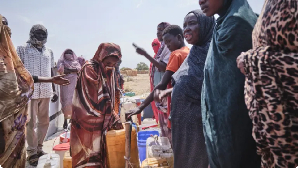Accra, April 20, GNA- Mrs. Akosua Frema Osei-Opare, Deputy Minister of Manpower, Youth and Employment, on Friday stressed that the country was making strides in her unbending commitment to eliminate the worst forms of child labour and hoped with collaboration with partners in industry and civil society, progress was being made towards the attainment of the goal.
Briefing the media on the release of a pilot Labour Survey in Cocoa Production in Ghana, Mrs. Osei-Opare said the report marked an important milestone in the long-term process to collect data on Labour practices and related information and expressed the hope that such efforts would guide targeted remediation efforts in the cocoa sector. Mrs. Osei-Opare said the country had a detailed, action-oriented plan to tackle issues in the cocoa sector, adding that any incidence of a child working in conditions, which were hazardous to their health, was unacceptable.
She said African cultural practices demanded that children help their parents and it was important for parents to consider certain factors that militate against the health, education and the general development of the child.
"Now, with the results from this survey, we can make a better life for our nation's children, by devoting greater effort to specific issues that require our immediate attention," she said.
Within the past decade, the issue of unacceptable child Labour practices within cocoa producing countries had become an increasing concern with those countries as well as within cocoa consuming countries.
In response, Ghana established a National Programme for the Elimination of Worst Forms of Child Labour (WFCL) in Cocoa (NPECLC), which sought to reduce the worst forms of child Labour to the barest minimum by 2011.
The Pilot Labour Survey is part of Ghana's on-going participation in Certification of Cocoa farming called "Harkin Engel Protocol" established in 2001 to address reports of the worst forms of child Labour on cocoa farms.
The report was released following the conclusion of a meeting of the National Steering Committee on the Elimination of Child Labour and was conducted by researchers from the Department of Agricultural Economics and Agribusiness, University of Ghana, Legon. The Pilot project surveyed 24 communities in a statistical sample of six cocoa-growing districts in Ghana during November and December last year (2006) and the overall objectives were to identify sources, types and periods of labour needs in Ghana's cocoa sector and to document indications of Worst Forms Of Child Labour and Forced Adult Labour.
The findings revealed, among other things, that, cocoa farming was largely a family enterprise in the country with 93.3 per cent of children living with their parents, and 6.7 percent living with either their "aunt" or "uncle".
The report also highlighted that 92 percent of most children work on cocoa farms on part-time basis with 91 percent of children being enrolled in schools.
It also revealed that out of the 610 children interviewed, only three percent aged between 15 to 17 years did not attend school. The findings revealed that personal freedom of children working on the cocoa farms were not usually restricted with 18 percent of children stating that they would find it difficult to leave the farm whenever they wanted.
The survey showed that 89 percent of the children carried heavy loads, 75 percent used cutlasses, 47 percent sprayed pesticides and that children working on cocoa farms could be involved in hazardous activities. 20 April 07
General News of Friday, 20 April 2007
Source: GNA
Report on Pilot Labour Survey in Cocoa sector
Entertainment

Seven popular Ghanaian songs sampled by foreign artistes
Opinions









